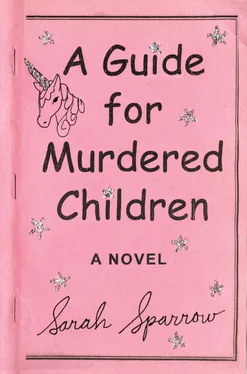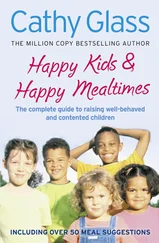Sarah Sparrow - A Guide for Murdered Children
Здесь есть возможность читать онлайн «Sarah Sparrow - A Guide for Murdered Children» весь текст электронной книги совершенно бесплатно (целиком полную версию без сокращений). В некоторых случаях можно слушать аудио, скачать через торрент в формате fb2 и присутствует краткое содержание. Город: New York, Год выпуска: 2018, ISBN: 2018, Издательство: Blue Rider Press, Жанр: Фэнтези, Триллер, Детектив, на английском языке. Описание произведения, (предисловие) а так же отзывы посетителей доступны на портале библиотеки ЛибКат.
- Название:A Guide for Murdered Children
- Автор:
- Издательство:Blue Rider Press
- Жанр:
- Год:2018
- Город:New York
- ISBN:978-0-399-57452-8
- Рейтинг книги:5 / 5. Голосов: 1
-
Избранное:Добавить в избранное
- Отзывы:
-
Ваша оценка:
- 100
- 1
- 2
- 3
- 4
- 5
A Guide for Murdered Children: краткое содержание, описание и аннотация
Предлагаем к чтению аннотацию, описание, краткое содержание или предисловие (зависит от того, что написал сам автор книги «A Guide for Murdered Children»). Если вы не нашли необходимую информацию о книге — напишите в комментариях, мы постараемся отыскать её.
A Guide for Murdered Children — читать онлайн бесплатно полную книгу (весь текст) целиком
Ниже представлен текст книги, разбитый по страницам. Система сохранения места последней прочитанной страницы, позволяет с удобством читать онлайн бесплатно книгу «A Guide for Murdered Children», без необходимости каждый раз заново искать на чём Вы остановились. Поставьте закладку, и сможете в любой момент перейти на страницу, на которой закончили чтение.
Интервал:
Закладка:
Willow threaded his way through a hundred travelers, then descended…
As he traversed the gently sloping ramps and jittery-solid iron staircases, it grew cooler and less populated. He made peace with the thought of never again surfacing to see the light. He decided that it would please him immensely to become a Phantom of the Underground. He thought of a documentary he once saw about the “mole people” who lived in forgotten tunnels that stretched from Penn Station to Harlem. In his stonedness, Willow knew that entering that dream would be infinitely preferable to the nightmare he was living.
He couldn’t determine how many levels down he’d gone. He mused about throwing himself in front of a train. At the Meadows, he became friends with a Londoner who did just that—a posh, witty man whose injuries forced him to scuttle through the rehab halls like a drunken insect. The fellow’s brain was damaged as well but his droll, mordant humor was thoroughly intact. I’d never be that lucky, thought Willow. I’d never live—but if I did, it would be in a hell of physical pain and permanent confusion.
He was about to plunk himself down on the cold concrete floor and wait for the mole people to claim him when he saw the signage:
He roused himself and stumbled toward his destination, feeling nearly whimsical. It was astonishing how quickly one’s mood could change — was nothing real? The reedy, serious-looking Ethiopian with high-boned, acne-scarred cheeks skeptically took him in.
Willow pulled himself together and said, “I’m interested in working on the train.”
“I’ll give you a form to fill out.”
“Is there a union?”
“Yeah, there’s a union.”
“I want to be a porter.”
“We don’t call them that.”
“What are they now, concierges?”
“Service attendants.”
“How long is the training?”
The man half-smiled, half-scowled. “I don’t have time for this shit.”
“Say what?” said Willow.
“Tell you what. If you want to take a urine test—and that test declares you are drug and alcohol free—I’ll get you a uniform and you can start right motherfucking now .”
“Done!” said Willow, triumphantly.
The smile-scowl instantly became a mask of brusque indifference. “Listen, mister, sober up and come back Monday when the lady in charge is here. ’Cause I cain’t do shit for you.”
Willow saluted him. “Thank you, broheem.”
He had no memory of how he found his way back to Tracks; it was as if he’d simply materialized there (same stool as before). With some curiosity, Willow noticed he was watching NY1 on the bar’s big-screen. Like a person regaining consciousness, the images slowly coalesced. A street reporter was talking gibberish until the words started making sense…
A shooting in Chelsea—drug deal gone wrong.
Then, an old mug shot of the dead man filled the screen:
It was—
Marlon?
Holy Jesus, thank God for the burner!
The death of the CI was an omen of unimaginable proportions. His trip to New York had been nothing less than a snapshot of the disasters that awaited… even the root canal loomed large. Again, the detective thought about jumping in front of a train—maybe, like his British friend, he’d survive, returning to scuttle among the tunnels as the Mayor of the mole people.
He staggered aboard.
He didn’t even bother telling himself the Big Lie, the Relapser’s Affirmation that falling off the wagon was an essential part of any drunk’s sobriety story… what didn’t kill you made you stronger… all is God’s will. The lie that when he got home, he would surrender anew to powerlessness, one day at a time.
He did think about telling Renata he’d picked up again. Though maybe he’d tough it out, keep his own counsel. More will be revealed…
Run silent, run deep —
If he did throw himself under the train, Pace would get a check for $250,000—he took out a policy in his late forties, when he became certain his hijinks would get him killed. Bullet to the leg notwithstanding, the odds of being killed on the job weren’t great; suicide was by far the biggest cop casualty. Self-removal nullified the contract only in the first few years, so he was good to go.
He was golden…
The train rumbled, pneumatically hissed and squeak-squealed. He fell into a deep, sweaty sleep, dreaming that he was on the train—not in the passenger car where he was now but a plush private cabin. A handsome, stately older woman came in to see him, carrying a tray with refreshments and a linen napkin. She whispered in his ear but he couldn’t understand what she was saying. At least she’d been kind enough to bring him a drink.
When he awakened, they were arriving in Pittsburgh. He frantically felt in his pocket for the piece of paper with Marlon’s cell phone number before remembering that he’d torn it up and thrown it away in the street after dismantling the burner. That was when Willow realized it was a different slip of paper he was searching for—the one with the address the woman on the train had given him. But there was no paper. Fragments of her whispers came back to him now.
She told him to memorize it.
And indeed an address stuck in his head, as if illuminated.
MAYA AND TROY
1.
It was notable that while Lydia intuited that the empty chair beside her was being saved for Daniel (the name “Troy” on the Guide ’s cover still seemed to carry no particular weight), she hadn’t given a single thought to his imminent arrival, not even by her third Meeting. Her indifference had more to do with the fact that everything was still so amorphous—that Lydia’s waking moments lived outside a kind of parentheses provided by the blurry, whoosh ing train that had brought her tenant, Maya, back to the world, this world, the earthly world of that little girl’s long-ago home. Lydia’s daily life, her practical, deputy life, seemed to be going just fine. Not too many glitches other than a general spaciness that friends and colleagues wrote off to the effects of PTSD related to the Tim Hortons shooting.
She looked forward to Annie’s church basement gatherings and even began to consider her fellow participants as friends. Not in the sense of grabbing a coffee and learning more about their lives—which the Porter actually discouraged, cautioning that it “pulled focus”—but thinking of them as she would family members. Conversation among the group before Meetings was typically confined to where they grew up and where they went to school. (Some bashfully said, “I stopped halfway through second grade,” meaning that was when their lives had ended.) Everyone seemed to know they were here for a single purpose, even if their shared goals were in various stages of fogginess or razor-clarity.
The common denominator, the heart glue holding the room together, was Annie. She gave out hugs when they came in and all lined up for hugs at Meeting’s end.
The ninety-minute Meetings were divided in two. In the first half, the shares tended toward a discharge of frustrations, worries and general fear, a “clearing of the table,” as Annie put it, in metaphorical preparation for the meal about to be served. Landlords and child-tenants both experienced “transition anxiety” (Annie’s phrase, again), rooted in the confusion of the old and new lives that were suddenly conjoined within. Considering the circumstances, it was amazing they hadn’t gone stark raving mad. But the Porter said such a thing never happened, “even if you do sometimes feel like you’re losing your marbles.” Everyone tittered at that old-timey phrase. She assured them that the longer they were here and the closer they came to fulfilling their purpose—what she called the moment of balance —the more focused they’d become, the more grounded, integrated and less afraid. Some, of course, were more integrated than others because they had been here longer. Like Dabba Doo, an older, bookish man who favored three-piece tweed ensembles but eschewed shoes and socks. He’d been coming to Meetings for seven months now, though at some point Lydia remembered Annie saying that six months was the “term limit.”
Читать дальшеИнтервал:
Закладка:
Похожие книги на «A Guide for Murdered Children»
Представляем Вашему вниманию похожие книги на «A Guide for Murdered Children» списком для выбора. Мы отобрали схожую по названию и смыслу литературу в надежде предоставить читателям больше вариантов отыскать новые, интересные, ещё непрочитанные произведения.
Обсуждение, отзывы о книге «A Guide for Murdered Children» и просто собственные мнения читателей. Оставьте ваши комментарии, напишите, что Вы думаете о произведении, его смысле или главных героях. Укажите что конкретно понравилось, а что нет, и почему Вы так считаете.












